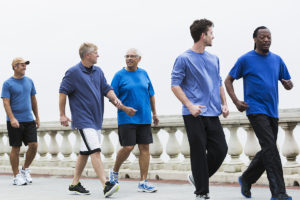Behavior Change
Sleep Loss? Vigorous Exercise May Reduce Cravings
Vigorous exercise may lessen food cravings and counteract mood impairments resulting from multiple nights of short or fragmented sleep.
How to Increase Men’s Physical Activity
Program directors vying to attract male participants to group exercise classes may want to consider men-only programming to increase physical activity.
Do Fitness Influencers Motivate Exercise Enthusiasts?
While social media influencers are known to affect purchasing decisions, it’s unclear whether they can positively influence health and fitness behaviors.
Weight Bias May Be Declining
More people share the viewpoint that those with obesity are being blamed for the disease, rather than getting medical help to manage it, according to research.
Physical Activity Prevents Early Death
Researchers examined information from 168 countries to find data supporting the advantages of healthy behaviors, including being physically active.
The Power of Connection in the Age of Social Distancing
Key strategies for making human connections with clients to help fitness professionals during this “new normal” and beyond.
Doing Good: A Positivity Multiplier
Add volunteering to the list of lifestyle activities that can promote health and well-being, according to a recent large-scale longitudinal study.
Encourage Kids to Choose Fun Physical Activities
The best way for parents to motivate kids to be active may be to emphasize a child’s feelings of choice, competence and social relatedness.
How to Succeed at Online Health Coaching
A great opportunity exists for health and wellness coaches ready to embrace the online/virtual environment through telemedicine and online coaching.
Help Clients Return to Training Safely, Smartly
Whether it’s been a few weeks or a few months, personal trainers must update programs to fit clients’ current status, not their pre-coronavirus fitness levels.
Game On for Weight Gain
According to a report in JAMA Paediatrics, spending too much time in the gaming world could be bad news for body composition down the road.
Weight Bias in the Health and Fitness Industry
In an industry that strives to help people improve health and fitness, there is still a significant amount of judgment and stigma toward people with obesity.
Health Lessons From the World’s Blue Zones
What can research teach us that supports lessons from people who consistently live longer than average in the world’s Blue Zones?
Active Commuting Linked to Heart Health
University of Leeds researchers in England found an association between heart health and active commuting among data for 43 million British working adults ages 25–74.
5 Healthy Habits
Following five lifestyle habits may increase the years you live free of type 2 diabetes, heart disease and cancer, according to a study in the BMJ (2020; doi:10.1136/bmj.16669).
Helping Teens With Obesity
Did you know that adolescent obesity has been linked to depression, anxiety, suicidal thoughts, poor self-esteem, attention deficit hyperactivity disorder, aggressive and destructive behavior, internet addiction, binging and purging, and other severe emotional outcomes (Reinehr 2018)? Emotional issues are often attributed to bullying and weight stigma.
Top Fitness Trend in China and South America
The number-one fitness trend identified in both China and South America is the inclusion of exercise in dietary weight-loss programs, according to ACSM’s
2020 Worldwide Survey of Fitness Trends. This could be the fitness industry responding to rising rates of overweight and obesity. In North America, exercise for weight loss has declined as a trend, superseded by health and wellness coaching.
Health and Wellness Coaching Approved as Healthcare Service
Health and wellness coaching has hit an important professional milestone. The AMA has officially recognized the role of health and wellness coaches as nonphysician healthcare professionals by approving procedural codes for tracking health and well-being coaching services. This means that health and wellness coaches who are certified by either the National Board of Health and Wellness Coaching (NBHWC) or by the National Commission for Health Education Credentialing Inc. are recognized as Category III healthcare professionals.
Dogs Help People Get Active
In a review of 10 studies—published between 1950 and 2019—that included 3.8 million people, researchers found that dog owners had a 24% lower risk of dying than nonowners during follow-up periods averaging 10 years.
Training Happy for Positive Behavioral Change
Are happiness exercises part of your training program design? Does that question seem odd? As you embark on a new year of helping clients work toward their fitness resolutions, this is the perfect time to pause and consider how you can use every tool at your disposal to make sure people succeed. Your toolbox includes harnessing the power of positivity to promote physical activity.



















